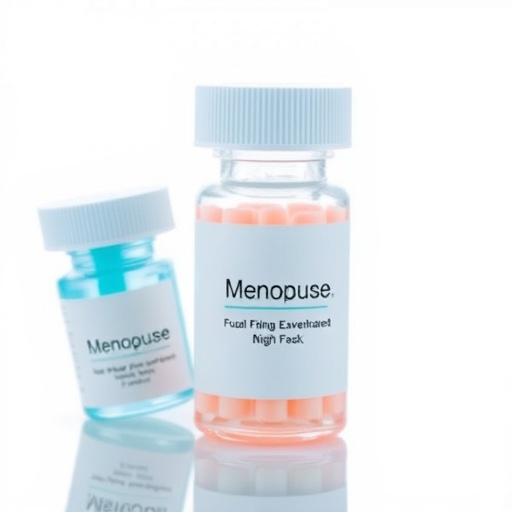In a breakthrough development poised to transform the management of menopausal symptoms, the U.S. Food and Drug Administration (FDA) has granted approval to elinzanetant, a novel nonhormonal therapeutic agent shown to markedly alleviate hot flashes and night sweats. This approval follows a series of rigorous, multi-national clinical trials, among which the UVA Health system was a pivotal testing site, underscoring the global collaboration behind this advancement.
Elinzanetant represents a new class of selective neurokinin receptor antagonists, which operate by modulating pathways implicated in thermoregulation and neuroendocrine signaling within the hypothalamus. Unlike traditional hormone replacement therapies (HRT), elinzanetant exerts its effect without introducing estrogen, offering a vital alternative for the substantial subset of menopausal women who are contraindicated for or hesitant to use hormonal treatments due to side effect profiles or cancer risk concerns.
The genesis of menopausal hot flashes lies in the fluctuating and eventual decline of circulating estrogen, destabilizing the hypothalamic thermoregulatory set-point. Conventional hormone therapy, while effective in mitigating these vasomotor symptoms, carries associated risks such as breast tenderness, thromboembolism, and certain malignancies, particularly with unopposed estrogen use. Consequently, the advent of a nonhormonal agent with demonstrable efficacy and safety is of considerable clinical significance.
In the double-blind, placebo-controlled Oasis clinical trials led by Dr. JoAnn V. Pinkerton and international collaborators, postmenopausal women between the ages of 40 and 65 experiencing moderate to severe vasomotor symptoms were administered 120 mg of elinzanetant daily over a 26-week period. The trials also included a cohort receiving placebo for 12 weeks followed by transition to elinzanetant. These trials meticulously measured outcomes including frequency and severity of hot flashes, sleep quality, mood disturbances, and overall quality of life indices.
Remarkably, elinzanetant recipients exhibited a statistically significant reduction in both the frequency and intensity of hot flashes within just one week of treatment initiation. These improvements persisted and deepened through the 12-week mark, accompanied by enhancements in subjective sleep quality and emotional wellbeing — factors critically impacting daily function and life satisfaction during the menopausal transition.
Mechanistically, the drug’s efficacy is attributed to its dual antagonism of neurokinin 1 and neurokinin 3 receptors. These receptors modulate the activity of neurokinin B, a neuropeptide intricately involved in triggering hot flashes via errant hypothalamic signaling. By inhibiting these receptor pathways, elinzanetant recalibrates neural circuits governing thermoregulatory balance without systemic hormonal manipulation, marking a paradigm shift in symptom targeting.
Crucially, the safety profile of elinzanetant emerged favorably in the clinical studies. The most commonly reported adverse events were mild headaches and fatigue, with no severe side effects or serious adverse events observed. This tolerability fosters broader patient acceptability and opens avenues for long-term symptom management without the risks overshadowing hormonal therapies.
Dr. Pinkerton emphasized that a substantial proportion of menopausal women—estimated to be over a third—experience persistent, disruptive symptoms lasting years beyond the typical menopausal transition, significantly compromising occupational, social, and domestic functioning. Until now, therapeutic options were limited and often unsuitable for many women, highlighting the urgent need for innovative alternatives like elinzanetant.
The approval of elinzanetant is emblematic of the increasing trend towards precision medicine, where interventions are tailored to individual physiological profiles and pharmacological responsiveness, minimizing side effects and maximizing clinical benefit. This drug’s mode of action exemplifies targeted pharmacotherapy that intervenes at neurochemical junctures implicated in symptom pathophysiology rather than broad hormonal replacement.
Moreover, this development carries implications beyond symptom relief. By improving sleep quality and mood disturbances commonly co-occurring with vasomotor symptoms, elinzanetant addresses the holistic burden of menopause-related health disruption. The integrative effect on neuropsychiatric and quality-of-life measures may ultimately mitigate associated risks such as cognitive decline and depression documented in this population.
This advancement underscores the importance of listening closely to patient experiences and unmet clinical needs, utilizing translational medicine approaches whereby preclinical insights into neurokinin receptor signaling have been efficiently leveraged into clinical applications. The collaborative Oasis trials, spanning multiple countries and healthcare centers, highlight the global scientific community’s role in expediting drug discovery and validation.
In sum, elinzanetant stands to redefine the therapeutic landscape for menopausal management, providing an evidence-based, FDA-sanctioned option for millions of women suffering from vasomotor symptoms who have long awaited alternatives to hormone therapy. Its introduction heralds a new era of neurokinin receptor antagonism in clinical medicine, with promising prospects for expansion into other symptomatic domains.
As the market unfolds for elinzanetant, ongoing post-marketing surveillance and further research will elucidate its long-term safety and efficacy spectrum, while potentially informing future combinatorial strategies with hormonal and nonhormonal agents. Meanwhile, healthcare providers now have an expanded armamentarium to individualize care, optimizing outcomes through patient-centered decision making.
For women navigating the multifaceted challenges of menopause, elinzanetant offers renewed hope and scientifically grounded relief, affirming the synergy of basic neuropharmacology and patient-focused clinical innovation. This therapeutic breakthrough invites reassessment of menopause symptom management paradigms and amplifies the call for continuing research into safe, effective, and personalized treatments.
Subject of Research: Menopausal symptom management, neurokinin receptor antagonism
Article Title: FDA Approves Elinzanetant: A Novel Nonhormonal Therapy for Menopausal Hot Flashes and Night Sweats
News Publication Date: [Not explicitly provided]
Web References: https://makingofmedicine.virginia.edu
Keywords: Menopause, Nonhormonal therapy, Elinzanetant, Hot flashes, Night sweats, Neurokinin receptor antagonists, FDA approval, Vasomotor symptoms, Sleep quality, Mood improvement, Personalized medicine, Clinical trials




